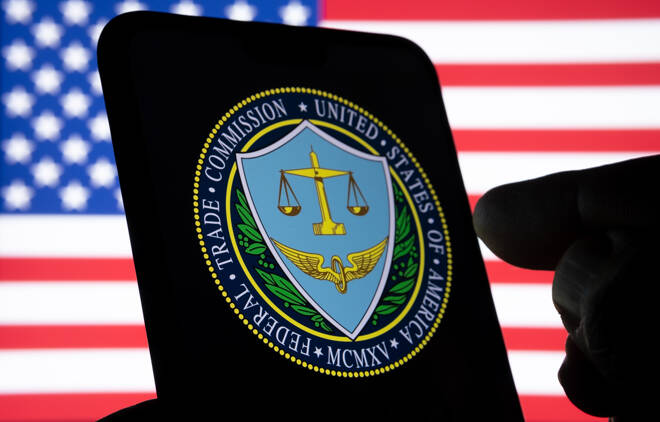Advertisement
Advertisement
A New Scam Directs Victims To Crypto ATMs To Send Money, Warns FTC
Updated: Jan 11, 2022, 14:14 GMT+00:00
The scam involves an impersonator, a QR code and a crypto ATM where fraudsters ask victims to cash in and purchase crypto.
The US Federal Trade Commission (FTC) has cautioned the public about a new scam involving transactions through a crypto ATM.
Per the warning, issued Monday, perpetrators pretend to be a representative from a government agency or law enforcement, or prize promoters. They trap the public via call, text, email, or social media messages, asking to pay money for a lottery or a prize, or even claiming a romantic interest for instance.
The impersonator then persuades victims to withdraw money from their bank or investment accounts. They stay on-call throughout to direct the victim to a nearby crypto ATM to deposit fiat money, to buy Bitcoin mostly. Once done, the fraudsters send a QR code with their crypto address embedded in it.
“Once you buy the cryptocurrency, they have you scan the code so the money gets transferred to them. But then your money is gone,” advised the FTC.
The alert comes at a time where there is an increase in scammers directing victims to use crypto ATMs and QR codes for transactions, a recent FBI alert noted.
The FTC reported in May 2021 that consumers sent over $2 million to impersonators pretending to be Tesla CEO Elon Musk. From October 2020 to May’21, nearly 7,000 people reported losses of more than $80 million on that and other fake crypto scams, with a median loss of $1,900.
“Many people have told the FTC they loaded cash into Bitcoin ATM machines to pay imposters claiming to be from the Social Security Administration. Others reported losing money to scammers posing as Coinbase, a well-known cryptocurrency exchange,” according to the report.
Repeated Warnings
The Federal Bureau of Investigation (FBI) started the trend of issuing warnings to the public on fraudulent schemes using cryptocurrency ATMs. “It is important to remain vigilant and not make payments to someone you have only spoken to online,” the FBI said in November.
HODL Bitcoin ATMs, an operator of Bitcoin ATMs in the states of Maryland, DC, and Virginia, has also warned its users over various possible scams including ATM frauds.
The Bitcoin ATM chain noted that “crypto transactions are irreversible.” It said, “Bitcoin transactions, including those from our machines, happen immediately and cannot be canceled or reversed. You should always err on the side of caution.”
According to Coin ATM Radar, many Bitcoin ATMs throughout the globe support cryptos like Ethereum, Bitcoin Cash, Dash, and Litecoin. For instance, a crypto ATM at Kenrail Towers in Nairobi supports buying BTC, ETH, LTC, and DOGE.
This makes it easy for impersonators to plan their criminal activities and widen their cryptocurrency choices.
Crypto Scam Report Portals
Both FTC and FBI have come up with a victim assistance portal, for those who have fallen into the trap of fraudsters. Victims are asked to report crypto fraudulent activities on the websites, to help fight scams.
FTC’s “Report Fraud” portal asks victims to report on any frauds or scams, including crypto payment frauds. FTC clearly mentions that “there’s almost no way to get that money back,” if paid in cryptocurrency.
The FBI has introduced a victim assistance program to support and assist victims in navigating the aftermath of crime and the criminal justice process.
Apart from the government assistance on victims, Cryptocurrency Compliance Cooperative, a collaborative association led by top Bitcoin ATM operators, helps combat crypto ATM frauds.
About the Author
Sujha Sundararajanauthor
Sujha Sundararajan is a writer-journalist with 7+ years of experience in Blockchain, Cryptocurrency and in general, FinTech news reporting. Her articles have featured in multiple journals such as CoinDesk, Protos, Bitcoin Magazine, CCN, Asia Blockchain Review, BeInCrypto and EconoTimes to name a few. She holds a Master’s in Journalism from the Indian Institute of Journalism and New Media and is also an accomplished Indian classical singer.
Advertisement
